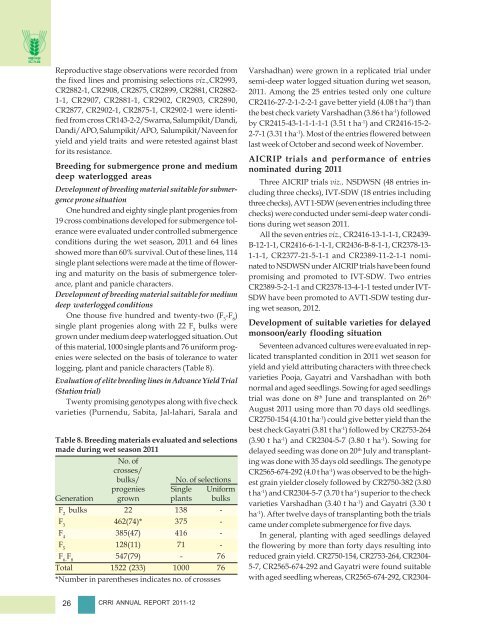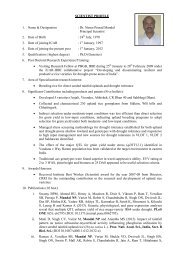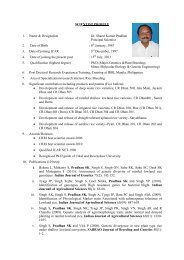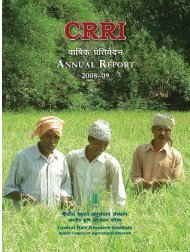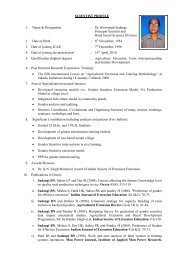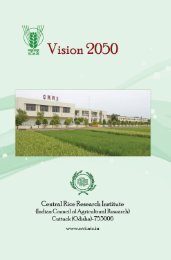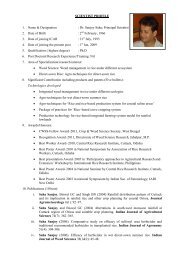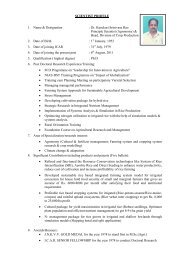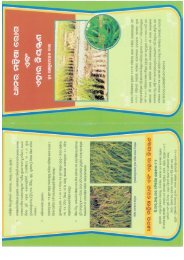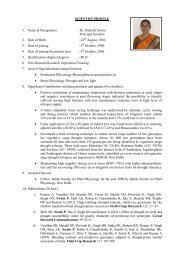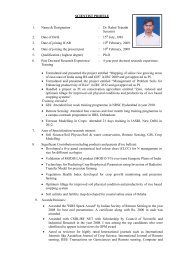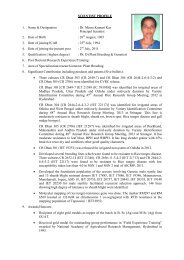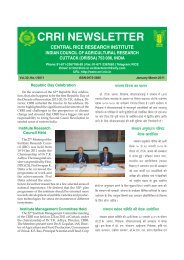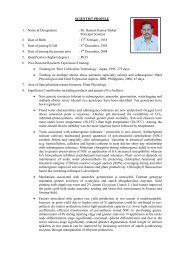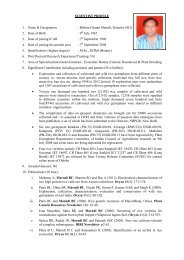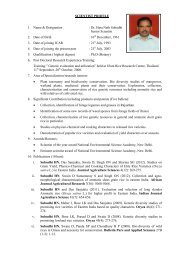Central Rice Research Institute Annual report...2011-12
Central Rice Research Institute Annual report...2011-12
Central Rice Research Institute Annual report...2011-12
Create successful ePaper yourself
Turn your PDF publications into a flip-book with our unique Google optimized e-Paper software.
Reproductive stage observations were recorded from<br />
the fixed lines and promising selections viz.,CR2993,<br />
CR2882-1, CR2908, CR2875, CR2899, CR2881, CR2882-<br />
1-1, CR2907, CR2881-1, CR2902, CR2903, CR2890,<br />
CR2877, CR2902-1, CR2875-1, CR2902-1 were identified<br />
from cross CR143-2-2/Swarna, Salumpikit/Dandi,<br />
Dandi/APO, Salumpikit/APO, Salumpikit/Naveen for<br />
yield and yield traits and were retested against blast<br />
for its resistance.<br />
Breeding for submergence prone and medium<br />
deep waterlogged areas<br />
Development of breeding material suitable for submergence<br />
prone situation<br />
One hundred and eighty single plant progenies from<br />
19 cross combinations developed for submergence tolerance<br />
were evaluated under controlled submergence<br />
conditions during the wet season, 2011 and 64 lines<br />
showed more than 60% survival. Out of these lines, 114<br />
single plant selections were made at the time of flowering<br />
and maturity on the basis of submergence tolerance,<br />
plant and panicle characters.<br />
Development of breeding material suitable for medium<br />
deep waterlogged conditions<br />
One thouse five hundred and twenty-two (F 3<br />
-F 8<br />
)<br />
single plant progenies along with 22 F 2<br />
bulks were<br />
grown under medium deep waterlogged situation. Out<br />
of this material, 1000 single plants and 76 uniform progenies<br />
were selected on the basis of tolerance to water<br />
logging, plant and panicle characters (Table 8).<br />
Evaluation of elite breeding lines in Advance Yield Trial<br />
(Station trial)<br />
Twenty promising genotypes along with five check<br />
varieties (Purnendu, Sabita, Jal-lahari, Sarala and<br />
Table 8. Breeding materials evaluated and selections<br />
made during wet season 2011<br />
No. of<br />
crosses/<br />
bulks/ No. of selections<br />
progenies Single Uniform<br />
Generation grown plants bulks<br />
F 2<br />
bulks 22 138 -<br />
F 3<br />
462(74)* 375 -<br />
F 4<br />
385(47) 416 -<br />
F 5<br />
<strong>12</strong>8(11) 71 -<br />
F 6-<br />
F 8<br />
547(79) - 76<br />
Total 1522 (233) 1000 76<br />
*Number in parentheses indicates no. of crossses<br />
Varshadhan) were grown in a replicated trial under<br />
semi-deep water logged situation during wet season,<br />
2011. Among the 25 entries tested only one culture<br />
CR2416-27-2-1-2-2-1 gave better yield (4.08 t ha -1 ) than<br />
the best check variety Varshadhan (3.86 t ha -1 ) followed<br />
by CR2415-43-1-1-1-1-1 (3.51 t ha -1 ) and CR2416-15-2-<br />
2-7-1 (3.31 t ha -1 ). Most of the entries flowered between<br />
last week of October and second week of November.<br />
AICRIP trials and performance of entries<br />
nominated during 2011<br />
Three AICRIP trials viz., NSDWSN (48 entries including<br />
three checks), IVT-SDW (18 entries including<br />
three checks), AVT 1-SDW (seven entries including three<br />
checks) were conducted under semi-deep water conditions<br />
during wet season 2011.<br />
All the seven entries viz., CR2416-13-1-1-1, CR2439-<br />
B-<strong>12</strong>-1-1, CR2416-6-1-1-1, CR2436-B-8-1-1, CR2378-13-<br />
1-1-1, CR2377-21-5-1-1 and CR2389-11-2-1-1 nominated<br />
to NSDWSN under AICRIP trials have been found<br />
promising and promoted to IVT-SDW. Two entries<br />
CR2389-5-2-1-1 and CR2378-13-4-1-1 tested under IVT-<br />
SDW have been promoted to AVT1-SDW testing during<br />
wet season, 20<strong>12</strong>.<br />
Development of suitable varieties for delayed<br />
monsoon/early flooding situation<br />
Seventeen advanced cultures were evaluated in replicated<br />
transplanted condition in 2011 wet season for<br />
yield and yield attributing characters with three check<br />
varieties Pooja, Gayatri and Varshadhan with both<br />
normal and aged seedlings. Sowing for aged seedlings<br />
trial was done on 8 th June and transplanted on 26 th<br />
August 2011 using more than 70 days old seedlings.<br />
CR2750-154 (4.10 t ha -1 ) could give better yield than the<br />
best check Gayatri (3.81 t ha -1 ) followed by CR2753-264<br />
(3.90 t ha -1 ) and CR2304-5-7 (3.80 t ha -1 ). Sowing for<br />
delayed seeding was done on 20 th July and transplanting<br />
was done with 35 days old seedlings. The genotype<br />
CR2565-674-292 (4.0 t ha -1 ) was observed to be the highest<br />
grain yielder closely followed by CR2750-382 (3.80<br />
t ha -1 ) and CR2304-5-7 (3.70 t ha -1 ) superior to the check<br />
varieties Varshadhan (3.40 t ha -1 ) and Gayatri (3.30 t<br />
ha -1 ). After twelve days of transplanting both the trials<br />
came under complete submergence for five days.<br />
In general, planting with aged seedlings delayed<br />
the flowering by more than forty days resulting into<br />
reduced grain yield. CR2750-154, CR2753-264, CR2304-<br />
5-7, CR2565-674-292 and Gayatri were found suitable<br />
with aged seedling whereas, CR2565-674-292, CR2304-<br />
26 CRRI ANNUAL REPORT 2011-<strong>12</strong>


